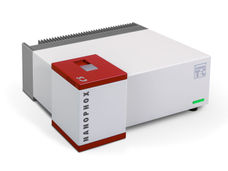New method for recovering pricey nanoparticles
Scientists are reporting first use of a new method that may make it easier for manufacturers to recover, recycle, and reuse nanoparticles, some of which ounce for ounce can be more precious than gold. The method, which offers a solution to a nagging problem, could speed application of nanotechnology in new generations of solar cells, flexible electronic displays, and other products, the scientists suggest. Their study appears in ACS' Langmuir.
Julian Eastoe and colleagues point out that scientists are seeking better ways to recover and reuse nanoparticles, which are barely 1/50,000th the width of a human hair. Without that technology, manufacturing processes that take advantage of nanoparticles' unusual properties might be prohibitively expensive. Recovering and recycling nanoparticles is especially difficult because they tend to form complex, hard-to-separate mixtures with other substances.
Eastoe and colleagues describe the development of a special type of microemulsion — a mixture of oil and water (mayonnaise is an edible emulsion) — that may solve this problem. In laboratory tests using cadmium and zinc nanoparticles, they showed how the oil and water in the microemulsion separated into two layers when heated. One layer contained nanoparticles that could be recovered and the other contained none. The separation process is reversible and the recovered particles retain their shape and chemical properties, which is crucial for their reuse, the scientists note.
Original publication: O Myakonkaya, C Guibert, J Eastoe, I Grillo; "Recovery of Nanoparticles Made Easy"; Langmuir, 2010, 26 (6), pp 3794-3797
Other news from the department science
These products might interest you

NANOPHOX CS by Sympatec
Particle size analysis in the nano range: Analyzing high concentrations with ease
Reliable results without time-consuming sample preparation

Eclipse by Wyatt Technology
FFF-MALS system for separation and characterization of macromolecules and nanoparticles
The latest and most innovative FFF system designed for highest usability, robustness and data quality

DynaPro Plate Reader III by Wyatt Technology
Screening of biopharmaceuticals and proteins with high-throughput dynamic light scattering (DLS)
Efficiently characterize your sample quality and stability from lead discovery to quality control

Get the chemical industry in your inbox
By submitting this form you agree that LUMITOS AG will send you the newsletter(s) selected above by email. Your data will not be passed on to third parties. Your data will be stored and processed in accordance with our data protection regulations. LUMITOS may contact you by email for the purpose of advertising or market and opinion surveys. You can revoke your consent at any time without giving reasons to LUMITOS AG, Ernst-Augustin-Str. 2, 12489 Berlin, Germany or by e-mail at revoke@lumitos.com with effect for the future. In addition, each email contains a link to unsubscribe from the corresponding newsletter.

























































